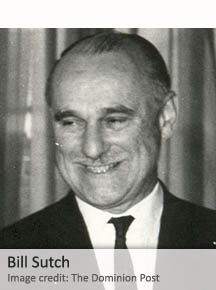Soviet documents ‘identify New Zealand diplomat as KGB spy’
August 11, 2014 3 Comments
 By JOSEPH FITSANAKIS | intelNews.org
By JOSEPH FITSANAKIS | intelNews.org
A batch of documents from the so-called ‘Mitrokhin archive’, which were made public late last week, have reportedly identified a former New Zealand senior diplomat as a Soviet spy. William Ball Sutch was born in 1907 and received a PhD in economics from Columbia University in the United States in 1932. Shortly afterwards, he returned to his native New Zealand in the midst of the Great Depression. At around that time he traveled to the Soviet Union, but showed no outward interest in communism. He entered government service, working for several departments, including the Ministry of Supply and the Department of Industries and Commerce, where he rose to the post of secretary in 1958. Prior to that, he had represented Wellington at the United Nations headquarters in New York in the early 1950s. He retired in 1965 as head of New Zealand’s Department of Industries and Commerce, and died in 1975. A year before his death, however, Sutch was the main subject in the most sensational spy scandal in New Zealand during the Cold War. He was arrested in a counterintelligence operation in Wellington while secretly meeting Dimitri Razgovorov, an officer of the Soviet KGB. Sutch, who had been monitored by the New Zealand Security Intelligence Service (NZSIS) for quite some time prior to his arrest, was charged under the country’s Official Secrets Act. But eventually he was found not guilty after an eventful five-day trial, which took place amidst a media blitz in the Kiwi capital. Now, however, the Wellington-based Dominion Post newspaper says it has acquired copies of internal KGB documents that identify Sutch as a KGB recruit. The Australian-owned newspaper says the documents are part of the massive archive transported to the United Kingdom in 1992 by the late Vasili Mitrokhin. Mitrokhin was a Soviet archivist for the KGB, who painstakingly copied tens of thousands of pages of the spy agency’s files prior to defecting to Britain following the dissolution of the USSR. The latest batch of papers, which were made public at Cambridge University’s Churchill College, indicate that the New Zealand diplomat worked for the KGB for 24 years prior to his 1974 arrest. According to The Dominion Post, the papers do not identify Sutch by name, but they mention an operative who went by the codename “Maori”, was born in 1907, had a PhD, and retired in 1965, all of which entirely match Sutch’s life and career. The Mitrokhin documents suggest “Maori” was recruited by the KGB in 1950, when Sutch was serving as Secretary General of New Zealand’s United Nations delegation in New York. The Dominion contacted Kit Bennetts, who led the NZSIS operation that led to Sutch’s arrest in 1974. He told the paper he was “delighted” at the news, “not because I want to stick it to Bill Sutch, but because I always knew it to be true”. But Sutch’s daughter, Helen, told the paper that the claims her father was a KGB spy were simply “absurd”.







Gents,
A little off the subject but I’d like to hear what you think. Do you believe that Tom Clancy’s “Cardinal of the Kremlin” was modelled on col Kuklinski, aka “Jack Strong”
If so, noting the publication of Clancy’s book, he must have had some good sources.
Regards,
Greg
A mystery remains as to what secrets for the Russians Bill Sutch, a New Zealander, generally out of the loop would have.
When at the UN the information on anti-Russian strategy he gained from the Five Eyes Anglo countries may have been useful to the Russians. Back in the very small New Zealand capital of Wellington he may have had may perhaps have had access to defense secrets from fellow officials, including New Zealand’s early (pre-GCSB) sigint setup.
More to the point Pete, perhaps the question should be ‘……. have access to?’